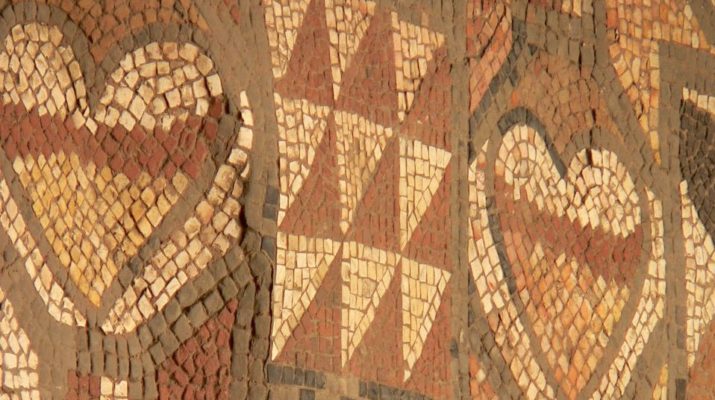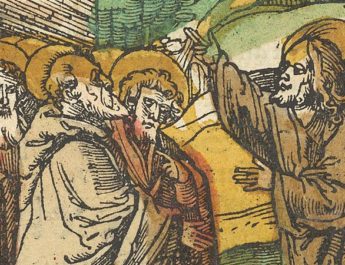Psalm 101
Of David.A A Psalm.B
1 I will singC of loyaltyD and of justice;E
A “David” = David. From the same as dod (beloved, love, uncle); the root may mean to boil, which is used figuratively to describe love. So, this implies someone you love such as a friend, a lover, or a close family member like an uncle. David’s name likely means something like “beloved one.”
B “Psalm” = mizmor. From zamar (making music; used specially of music to worship God; music with singing, singing praise, singing psalms); may be from zamar (to trim or prune). This is a melody or a psalm.
C “sing” = shir. From shir (song, singer). This is to sing. It could also refer to one who is singing or leading others in song.
D “loyalty” = chesed. From chasad (being good, kind, merciful; may mean bowing one’s neck as is done in the presence of an equal for courtesy’s sake; so, if one in a superior position is treating you like an equal, that is what is captured here). This is favor, goodness, kindness, loving kindness, pity, reproach, or a good deed. When done by God to humanity, this is mercy/loving kindness. When done by humanity to God, it is piety.
E “justice” = mishpat. From shaphat (to judge, defend, pronounce judgment, condemn, govern). This is a verdict or formal sentence whether from humans or from God. It includes the act of judging as well as the place that judging takes place, the suit itself, and the penalty. Abstractly, this is justice, which includes the rights of the participants.
to you, O Lord,F I will sing.G
2 I will studyH the wayI that is blameless.J
When shall I attainK it?
F “Lord” = YHVH. From havah (to be, become) or hayah (to come to pass, become, be). This is the name of the God of Israel, the self-existent and eternal one, the tetragrammaton. This pronunciation has been lost to time so “Lord” is generally used in its place.
G “sing” = zamar. Related to “Psalm” ins superscript. See note B above.
H “study” = sakal. This is to consider or be prudent and so it can mean to instruct or be an expert. It can also mean dealing prudently, which implies success and prospering. This verb presumes intelligence of the subject. In one form of the verb, it can mean laying cross-wise.
I “way” = derek. From darak (to tread, march, to walk. Can also mean affixing a string to a box since one needs to step on it to bend it in the process; so also an archer). This is a road as a thing that is walked on. Can be used figuratively for the path that one’s life takes or how one chooses to live one’s life.
J “blameless” = tamim. From tamam (to finish or accomplish; to make perfect, demonstrate that you are upright; consume; to complete in a literal or figurative sense). This is entire in a literal or figurative sense. So, it could be complete, full, intact, or without defect. Alternately, it could refer to being sound, having integrity, being sincere or perfect.
K “attain” = bo. This is to enter, come in, advance, fulfill, bring offerings, enter to worship, attack. It can also have a sexual connotation.
I will walkL with integrityM of heartN
withinO my house;P
L “walk” = halak. This is go, come, walk. It is walk literally and figuratively and includes people and animals. It can be used figuratively for one’s moral life – how we walk according to God’s way or against it. It can also refer to the walk of life as in the course one’s life takes, the choices we make, etc.
M “integrity” = tom. Related to “blameless” in v2. From tamam (see note J above). This is completeness or full measure. So, it can be blameless, moral innocence, prosperity, or integrity. Also used to refer to a portion of the high priest’s breastplate.
N “heart” = lebab. May be related to labab (to encourage; properly, to be encased as with fat; used in a good sense, this means to transport someone with love; used in a bad sense, it can mean to dull one’s senses). This is the heart, courage, one’s inner self, the mind, or the will. Heart is only used in a figurative sense in the Old and New Testaments.
O “within” = qereb. Perhaps from qarab (to come near or approach). This is among, in the midst, before, the center It is the inward part, whether literal or figurative. It can also be used for the heart, the site of thoughts and feelings. This word is also used as a technical term for the entrails of the animals who are sacrificed.
P “house” = bayit. Probably from banah (to build, make, set up, obtain children; to build literally or figuratively). This is house, court, family, palace, temple.
3 I will not setQ beforeR my eyesS
anythingT that is base.U
Q “set” = shith. This is to place, set, bring, appoint, consider, bring, array or look.
R “before” = neged. From nagad (to declare, make conspicuous, stand in front, manifest, predict, explain). This is in front of, opposite to. It can refer to a counterpart or partner, one corresponding to or in the sight of.
S “eyes” = ayin. This is eye in a literal or figurative sense so eye, appearance, favor, or a fountain (the eye of the landscape).
T “anything” = dabar. From dabar (to speak, declare, discuss). This is speech, a word, a matter, an affair, charge, command, message, promise, purpose, report, request. It is a word, which implies things that are spoken of in a wide sense.
U “base” = beliyyaal. From beli (lack, nothing, without, wearing out, failure, destruction); {from balah (to grow old, wear out, waste away, consume, spend)} + yaal (to gain, profit, do good, ascend, be useful or valuable; benefitted). This is lacking profit i.e. worthlessness, destruction, evil, ungodly person, wickedness, or Belial.
I hateV the workW of those who fall away;X
it shall not clingY to me.
V “hate” = sane. This is to hate, an enemy. It is a personal hatred and not an abstract one.
W “work” = asah. This is to make, do, act, appoint, become in many senses.
X “fall away” = sut. 2x in OT. This is to fall away, lapse, turn to the wrong practice. So, it is used for acts of idolatry.
Y “cling” = dabaq. This is to follow closely or abide fast, to cling or be joined together. Figuratively, it can mean to catch something by chasing after it, to overtake, or to stick. A man clings to his wife in Genesis 2:24, Shechem was deeply attracted to Dinah in Genesis 34:3, Ruth clung to Naomi in Ruth 1:14, Solomon clung to his foreign wives and concubines in 1 Kings 11:2. It is also used of a tongue sticking to the mouth, pursuing or overtaking as in battle, and also clinging to God.
4 PerversenessZ of heart shall be farAA from me;
I will knowBB nothing of evil.CC
Z “perverseness” = iqqesh. 11x in OT. From aqash (to twist, knot, distort; to act in a perverse manner). This is twisted, distorted, crooked, or perverted.
AA “be far” = sur. This is to turn aside in a literal or figurative sense – to depart, decline, rebel, remove, or withdraw.
BB “know” = yada. This is to know, acknowledge, advise, answer, be aware, be acquainted with. Properly, this is to figure something out by seeing. It includes ideas of observation, recognition, and care about something. It can be used causatively for instruction, designation, and punishment.
CC “evil” = ra’. From ra’a’ (to be evil, bad, afflict; properly, to spoil – to destroy by breaking into pieces; figuratively, to cause something to be worthless; this is bad in a physical, social, or moral sense; that which displeases, to do harm or mischief, to punish or vex). This is bad, disagreeable, that which causes pain, misery, something having little or no value, something that is ethically bad, wicked, injury, calamity. This refers to anything that is not what it ought to be – a natural disaster, a disfigurement, an injury, a sin.
5 One who secretlyDD slandersEE a neighborFF
I will destroy.GG
DD “secretly” = sether. From sathar (hide, conceal, or be absent; hiding because something is covered – used in a literal or figurative sense). This is covering, shelter, protection, hiding place. It can be hidden by a mountain, by clouds, in the womb, in a matter of secrecy, through slander, or of nations.
EE “slanders” = lashan. 2x in OT. From lashon (tongue, talker, language, or wedge; a tongue of flame or a water cove). This is to use one’s tongue. Originally, to lick. Figuratively, to slander or make an accusation – wag the tongue.
FF “neighbor” = rea. From raah (to associate with). This is the same as neighbor in Leviticus 19:18 “love your neighbor as yourself.” This is friend, companion, fellow, neighbor. It is someone with whom you associate, whether more or less close.
GG “destroy” = tsamath. 15x in OT. This is to destroy, cut off, silence, or vanish. It is to put an end to in a literal or figurative sense.
A haughtyHH lookII and an arrogantJJ heart
I will not tolerate.KK
HH “haughty” = gabah. 4x in OT. From the same as gaboah (high, tall, long, proud, or arrogant; a high ranking official, someone exalted, or something lofty); from gabah (to be tall, high, exalted, proud, haughty). This is high in a literal or figurative sense. It can also mean proud.
II “look” = ayin. Same as “eyes” in v3. See note S above.
JJ “arrogant” = rachab. From rachab (to grow wide or enlarge in a literal or figurative sense; extend, relieve, rejoice, or speak boldly). This is wide, extensive, spacious, or vast. It is roomy in a literal or figurative sense. It can also mean liberty or proud.
KK “tolerate” = yakol. This is to be able, endure, overcome, prevail.
6 I will look with favorLL on the faithfulMM in the land,NN
so that they may liveOO with me;
whoever walks in the way that is blameless
shall ministerPP to me.
LL “look with favor” = ayin. Literally, “my eyes on the faithful.” Same as “eyes” in v3. See note S above.
MM “faithful” = aman. This is to believe, endure, fulfill, confirm, support, be faithful. It is to put one’s trust in, be steadfast. Figuratively, this is to be firm, steadfast, or faithful, trusting, believing, being permanent, morally solid. This is where the word “amen” comes from.
NN “land” = erets. Root may mean to be firm. This is earth, ground, field land, or country.
OO “live” = yashab. This is to sit and so to remain and so to dwell. It is sitting for any reason – as a judge, in order to ambush, or just sitting quietly. Causatively, this can mean settling or marrying. This can also mean continue, endure, or establish.
PP “minister” = sharath. This is ministering, serving, or waiting on. It can refer to one offering service as a worshipper or one serving as a servant.
7 No one who practicesQQ deceitRR
shall remainSS inTT my house;
no one who uttersUU liesVV
shall continueWW inXX my presence.YY
QQ “practices” = asah. Same as “work” in v3. See note W above.
RR “deceit” = rmiyah. 15x in OT. From ramah (to betray, deceive, beguile). This is deceit, treachery, or guile. It could also mean idle or slothful.
SS “remain” = yashab. Same as “live” in v6. See note OO above.
TT “in” = qereb. Same as “within” in v2. See note O above.
UU “utters” = dabar. Related to “anything” in v3. See note T above.
VV “lies” = sheqer. This is deception, lie, or disappointment. It can also be something that is vain or wrongfully.
WW “continue” = kun. Properly, this means in a perpendicular position. So, it is set up in a literal sense – establish, fix, fasten, prepare. In a figurative sense, it is certainty, to be firm, faithfulness, render sure or prosperous.
XX “in” = neged. Same as “before” in v3. See note R above.
YY “presence” = ayin. Same as “eyes” in v3. See note S above.
8 Morning by morningZZ I will destroy
allAAA the wickedBBB in the land,
cutting offCCC all evildoersDDD
from the cityEEE of the Lord.
ZZ “morning by morning” = boqer. Literally, “mornings.” From baqar (to seek, plow, break forth, admire, care for). This refers to the break of day. So it is dawn, early, morning, or morrow.
AAA “all” = kol. From kalal (to complete). This is all or every.
BBB “wicked” = rasha. This is morally wrong so it refers to someone who is actively bad as wicked, criminal, an evil person, offender, condemned, or ungodly.
CCC “cutting off” = karat. This is to cut down, cut off, or make a covenant (idiom for making a covenant is “to cut a covenant”). It can also mean to destroy, fail, or consume.
DDD “evildoers” = paal + aven. Paal is to do, make, work, or accomplish. Generally refers to regularly repeated or systematic action – so, to practice. Aven has a root that may mean panting as one does when expending a lot of energy, especially when it comes to nothing. This is nothingness, trouble, sorrow, distress, wickedness, evil, harm, sorrow, misfortune, and mischief. It is also used specifically to refer to idols.
EEE “city” = iyr. From uwr (to awaken or wake oneself up). This can mean excitement in the sense of wakefulness or city. Properly, this is a place that is guarded. Guards kept schedules according to watches. This sense of the word would include cities as well as encampments or posts that were guarded.
Image credit: Mosaic from Lullingstone Roman Villa, 4th century in Eynsford, United Kingdom.




